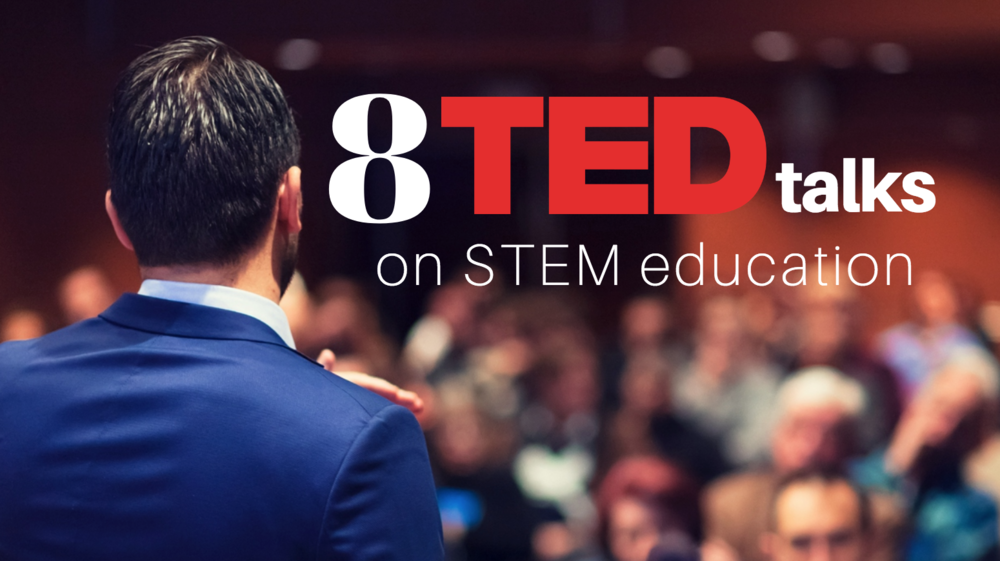
Section Branding
Header Content
8 STEMulating TED Talks For Teachers
Primary Content

Another school year is upon us! Minds are refreshed, motivation is bountiful, and teachers are eager for new ideas for their classrooms. With so many fresh resources to explore, it can be hard to choose where to begin. We’ve put together eight motivational TED Talks from teachers, tinkers, and thinkers that will inspire any educator to incorporate STEM concepts into the classroom.
1. STEM Education: Developing 21st century problem solvers
National Teacher of the Year Finalist, Rob Stephenson, presents instructional strategies and the integration of STEM education challenges in his third grade classroom. He articulates why STEM education needs to become a part of every child's learning experience at home, at school, and within the community. Mr. Stephenson gives stakeholders practical advice on how adults can foster and protect children's natural desire to discover and invent in order to stimulate the next generation of perseverant problem-solvers.
2. How you can be good at math, and other surprising facts about learning
You have probably heard people say they are just bad at math, or perhaps you yourself feel like you are not “a math person.” Not so, says Stanford mathematics education professor Jo Boaler, who shares the brain research showing that with the right teaching and messages, we can all be good at math. Not only that, our brains operate differently when we believe in ourselves. Boaler gives hope to the the mathematically fearful or challenged, shows a pathway to success, and brings into question the very basics of how our teachers approach what should be a rewarding experience for all children and adults.
3. Inspiring the next generation of female engineers
Close your eyes and picture and engineer. You probably weren't envisioning Debbie Sterling. Debbie Sterling is an engineer and founder of GoldieBlox, a toy company out to inspire the next generation of female engineers. She has made it her mission in life to tackle the gender gap in science, technology, engineering and math.
4. Meet Spot, the robot dog that can run, hop and open doors
That science fiction future where robots can do what people and animals do may be closer than you think. Marc Raibert, founder of Boston Dynamics, is developing advanced robots that can gallop like a cheetah, negotiate 10 inches of snow, walk upright on two legs and even open doors and deliver packages. Join Raibert for a live demo of SpotMini, a nimble robot that maps the space around it, handles objects, climbs stairs -- and could soon be helping you out around the house.
5. How I teach kids to love science
At the Harbour School in Hong Kong, TED Senior Fellow Cesar Harada teaches citizen science and invention to the next generation of environmentalists. He's moved his classroom into an industrial mega-space where imaginative kids work with wood, metal, chemistry, biology, optics and, occasionally, power tools to create solutions to the threats facing the world's oceans. There, he instills a universal lesson that his own parents taught him at a young age: "You can make a mess, but you have to clean up after yourself."
6. Why you should make useless things
In this joyful, heartfelt talk featuring demos of her wonderfully wacky creations, Simone Giertz shares her craft: making useless robots. Her inventions -- designed to chop vegetables, cut hair, apply lipstick and more -- rarely (if ever) succeed, and that's the point. "The true beauty of making useless things [is] this acknowledgment that you don't always know what the best answer is," Giertz says. "It turns off that voice in your head that tells you that you know exactly how the world works. Maybe a toothbrush helmet isn't the answer, but at least you're asking the question."
7. This company pays kids to do their math homework
Mohamad Jebara loves mathematics -- but he's concerned that too many students grow up thinking that this beautiful, rewarding subject is difficult and boring. His company is experimenting with a bold idea: paying students for completing weekly math homework. He explores the ethics of this model and how it's helping students -- and why learning math is crucial in the era of fake news.
8. Building blocks that blink, beep and teach
Imagine a set of electronics as easy to play with as Legos. TED Fellow Ayah Bdeir introduces littleBits, a set of simple, interchangeable blocks that make programming as simple and important a part of creativity as snapping blocks together.
For more STEM resources, follow us on Twitter and Facebook!
These eight motivational TED Talks from teachers, tinkers, and thinkers will inspire any educator to incorporate STEM concepts into the classroom.





